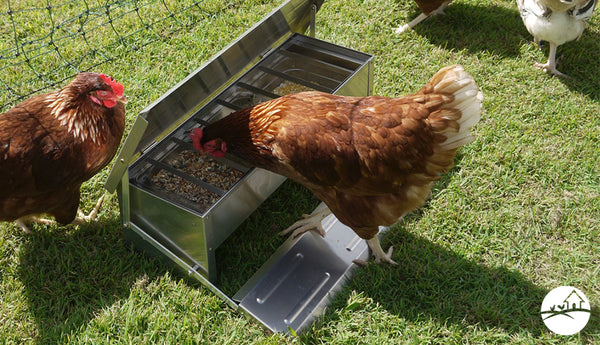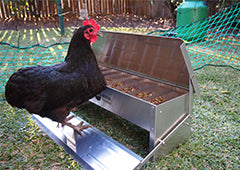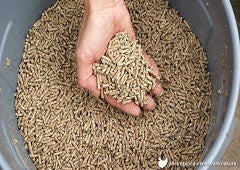Chicken Ladies everywhere are treating their girls to some nutritious feed and reliving the 70's by sprouting their own seeds at home! Sprouting your own seeds is an easy, cheap and fun way to feed your flock of flapping ladies all year round. So, if you’re looking to improve your flock’s diet, as well as saving a few extra dollars at the checkout, you definitely need to read this eggcellent article and find out if sprouting your own seeds is right for you.
What are the benefits of feeding my flock seed sprouts?
There are actually many benefits for feeding your flock seed sprouts, which can be broken down in three key factors: cost, health and availability.
A cheep feed solution:
Though it is not recommended to feed your chickens a diet of nothing but seed sprouts, they are definitely an affordable way to give bring some diversity to their eating habits. Most sprouting seeds can be bought in bulk for an inexpensive price either online or in any good gardening stores.
Great for hen health:
Sprouting seeds are a rich source of immune boosting anti-oxidants, as well as other essential vitamins and minerals that will help your chickens feel bright and perky. Sprouted seeds are also easier to digest than regular grain, as well as being loaded with chlorophyll and beta-carotene, which will help your girls produce eggs with darker, tastier yolks. Of course, as mentioned previously, sprouted seeds should be fed to your flock as a part of a balanced diet that should include regular chicken feed, shell grit, other scraps and treats.
Can be produced all year long:
Sprouting seeds are not effected by changes in the weather and can be produced all year long, unlike other popular seasonal treats, like pumpkin, leek and cauliflower. Whether it is swelteringly hot or snowing outside, sprouting seeds can be produced in jars and containers in any season, rain, hail or shine. All you need are the right seeds, access to running water and a container of some kind – it’s that easy!
Diversifying your laying ladies diet is one of the simplest ways to ensure they are getting a balance of the right vitamins and minerals. For more targeted diet supplements, like increasing your chickens’ protein intake, please just follow the link here.
What sprouting seeds should I feed my chickens?
Producing your own sprouting seeds is exceptionally easy, and the only difficult point of contention boils down to which type of seeds you wish to grow. Lentils are one of the easiest and most nutritious seeds to sprout, as they grow quite rapidly and aren’t prone to developing mould spores. Other seeds, like alfalfa, mustard and mung beans, are relatively easy to grow, but are slightly more prone to mould. The best way to find out what works best for you is to experiment with different varieties, all of which are on the cheap side. Other seeds to consider: wheat, spelt and millet.

How do I grow sprouts?
Growing sprouts is remarkably easy so long as you understand the basic logic behind it. Have a read of these no fuss instructions, but do not feel obliged to follow every step to the letter.
Here’s what you’ll need:
-
A large jar or container.
-
Seeds.
-
An old piece of cloth (or a very narrow sieve).
NOTE: Seed sprouts need plenty of room to breathe and expand so it’s best to work on the ratio of 25g of seeds to every litre of space in the container. For example if you are using a large 2L jar to grow your sprouts it’s best to only put in 50g of seeds at most.

Here’s what you do:
-
Place your seeds into a sieve and wash them thoroughly with cool tap water.
-
Move your seeds into a large bowl, fill it with water (about 5cm higher than the level of the seeds) and leave them to soak for 8 to 12 hours. NOTE: It’s normally a good idea to change the water at least once during the soaking process.
-
Pour the seeds into a large jar or container, with plenty of space for the seeds to sprout, grow, breathe and expand.
-
Seal the lid of the jar or container either with a thin cloth and an elastic band. NOTE: Basically you are trying to create a makeshift sieve which will allow you to pour water from the jar or container without the seed sprouts falling out – feel free to get inventive!
-
Tip the sealed jar over and allow of the excess moisture to drain out.
-
Leave the jar in a slightly sunny spot for 8 to 9 hours.
-
Repeat steps 2 through to 6 every 8-9 hours or at least twice a day. NOTE: Seeds should begin to sprout and grow within the first few days – if not, something has probably gone wrong.
-
Seeds should well and truly be sprouting by day 5 and that’s perfect time to feed them to your lucky chooks!
And voila! Bon appetite! Presto! Huzzah! Happy days! Your chooks will gobble up these tasty seed sprouts like they were candy!
Growing seed sprouts for your laying ladies is one of the purest ways you can express your love and affection for your flock of fine feathered friends. But, if you really want to cultivate a flock of chipper and cheery chooks, they need a coop with character. Make sure you check out the Taj Mahal, Penthouse and Mansion coops, which will surely put a smile on your ladies beaks.
Knowing the best feed, shelter and products for our chooks helps us to be eggcellent keepers. There are just so many things to consider when becoming a chicken parent from other pets to health issues. Did you know many chicken keepers struggle to handle chicken health or behaviour issues, especially in the first few years of having a flock?
This is why I recommend Chickenpedia to all my readers. They have comprehensive online courses on everything you didn’t know you need to know and then some more! From healthcare to raising baby chicks to feeding and behavior, you’ll find beginner-friendly courses that’ll give you the knowledge and confidence to successfully look after your chickens.
As a member, you will get access to ALL their incredible courses. No need to wing it, become the ultimate chicken eggspert! Check out Chickenpedia today!


















